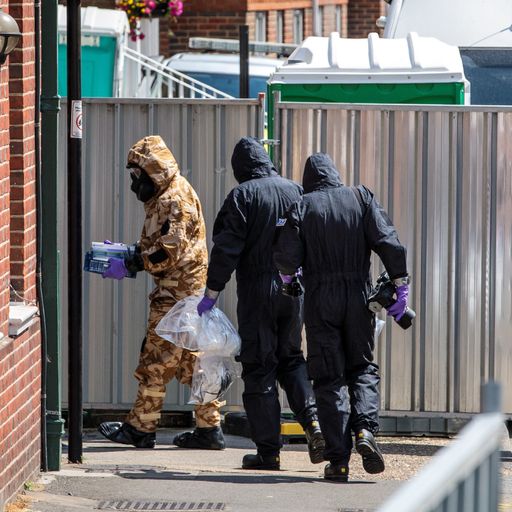Sky Views: More must be done to deter another novichok attack

Sunday 3 March 2019 06:52, UK
By Deborah Haynes, foreign affairs editor
Attention will focus again on Salisbury on Monday for the first anniversary of the novichok nerve agent attack on a former Russian spy and his daughter.
The attempted assassination marked the first time a chemical weapon was used in Europe since the end of the Second World War, and yet one year on not enough has been done to deter the same thing from happening again.
That's not to underplay the significant response by the UK and its allies to punish the Kremlin - in particular Russia's military intelligence agency the GRU - for its suspected hand in the poisoning of Sergei and Yulia Skripal.
President Vladimir Putin may well have been surprised at the co-ordinated decision by more than two dozen countries, including the United States, to expel around 150 Russian diplomats.
Britain also collaborated with allies to call out the GRU for a number of cyber attacks, including the alleged attempted penetration of the world's chemical weapons watchdog, the Organisation for the Prohibition of Chemical Weapons.
And police and prosecutors named and charged two Russian military intelligence officers with spraying the novichok poison on the front door of Mr Skripal's house on 4 March 2018.
Closed circuit television camera images of the men - identified by their aliases - were also released.
The move prompted an awkward appearance by the pair on Russia Today, the Kremlin-funded broadcaster.
Their attempts to explain their presence in Salisbury as a tourist trip to see the cathedral and its "famous... 123-metre spire" even raised the eyebrows of Kremlin supporters.
The men's real identities - Alexander Mishkin and Anatoliy Chepiga - were subsequently revealed by the investigative website Bellingcat.
These examples show how Britain took a much more robust line with the Kremlin and acted a lot faster over the Skripal attack than when another former Russian spy, Alexander Litvinenko, was killed in London with radioactive polonium-210 in 2006.
Yet the cost to the Kremlin of a state-sponsored chemical weapons attack has not been made to feel so high as to make the possibility of another attempt completely out of the question.
This is in part a reflection of how difficult it is to deter unconventional forms of warfare at a time when President Putin's Russia regards the UK and its NATO allies a threat.
Within this space, the UK did become a lot better at exposing a barrage of what officials say is Russian state-sponsored disinformation, spreading an array of counter-narratives and conspiracy theories about the attack.
But fake claims still appear on social media feeds such as Twitter and Facebook and are carried by pro-Kremlin media channels.
The limits of Britain's deterrence is also because of a persistent unwillingness to unleash all UK capabilities to hurt Moscow and drive home the message: never again try to conduct murder on UK soil.
So we are left in a strange sort of limbo, with nascent signs even of an attempt to try to rekindle relations in some limited way.
Sir Alan Duncan, a Foreign and Commonwealth Office minister, met his Russian counterpart, First Deputy Foreign Minister Vladimir Titov, on the sidelines of a security conference in Munich last month - an encounter thought to have been initiated by Russia.
Any developments in the ongoing police investigation into the Skripal attack could provide evidence to exert new pressure on Russia over what happened, even though President Putin maintains his country had nothing to do with the poisoning.
Either way there seems little chance of anyone being prosecuted and going to prison any time soon.
Sky Views is a series of comment pieces by Paste BN editors and correspondents, published every morning.
Previously on Sky Views: Adam Boulton - It's too late to reverse climate change









